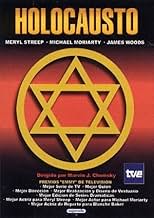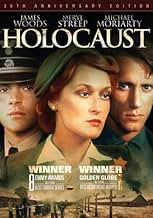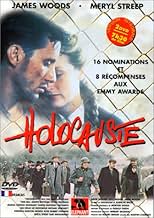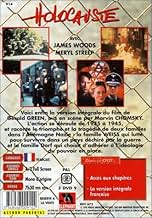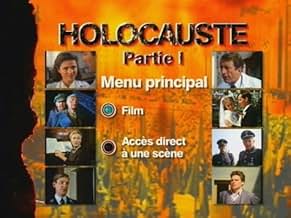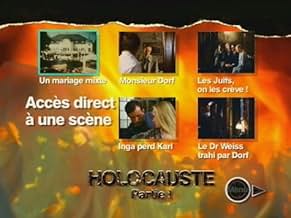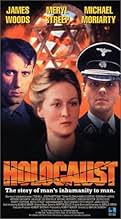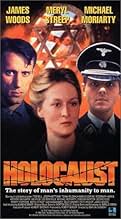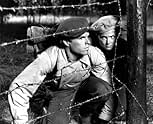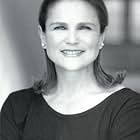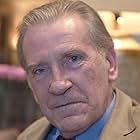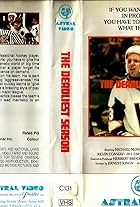The saga of a Jewish family's struggle to survive the horror of Nazi Germany's systematic marginalization and extermination of their community.The saga of a Jewish family's struggle to survive the horror of Nazi Germany's systematic marginalization and extermination of their community.The saga of a Jewish family's struggle to survive the horror of Nazi Germany's systematic marginalization and extermination of their community.
- Won 8 Primetime Emmys
- 18 wins & 11 nominations total
Browse episodes
Storyline
Did you know
- TriviaThe term "Holocaust" didn't exist in the German language until the 1980s. Due to the great success of this mini-series, it became common knowledge, and was chosen as "word of the year 1979" by the "Gesellschaft für deutsche Sprache" (Society for German Language).
- Quotes
Moses Weiss: I have the right name but I'm afraid I can't lead you to the promised land.
- Alternate versionsPolish authorities protested against a scene in which soldiers dressed in Polish uniforms executed Jewish prisoners. The poles didn't have any "Quisling army" during the war. The scene was trimmed and now shows the rifles and the arms of the soldiers in question. Even so, both versions apparently remained in circulation as Danish TV originally showed the original version, and Swedish TV the trimmed version within weeks of each other.
- ConnectionsFeatured in The 30th Annual Primetime Emmy Awards (1978)
Featured review
If you were only to see one movie, one television series in your life about the Holocaust (and you should see more), this would be it.
It is the most wide-ranging, most thorough examination of what happened to central and eastern Europe's Jews between 1935 and 1945. The series focuses not on one camp: but on several (Auschwitz, Theresienstadt, Buchenwald, Sobribor - and hear much of Maidenek, Dachau, and others). We see the creation and changes in the ghetto in Warsaw (and hear of the ghettos in Vilnius and elsewhere). We see the evolution in the methods of killing Jews - and why. We see what happened to those deemed defectives at yet another camp.
With two exceptions, I found the acting (by a truly stunning cast - from Nigel Hawthorne to Ian Holm, from James Woods to T.P. McKenna, from Meryl Streep to David Warner, from Rosemary Harris to Sam Wanamaker, from Fritz Weaver to Tovah Feldshuh, Robert Stephens to Deborah Norton, Michael Moriarty) superb - truly moving and powerful. The two exceptions were the daughter Anna and the son Rudy played by Joseph Bottoms. This may not be entirely their fault - their parts are so underwritten - conventional.
The fantastic aspect of this series is its scope - you really do have a grounding in the Holocaust that would serve you well reading any history, seeing any movies set in this time.
The downside is that as fine as the acting is, the series is split among the stories of six to eight people over the course of a decade - which inevitably limits how moved the audience is by the story of each. Thus, in contrast to say, Schindler's List or The Pianist, we are not living and breathing with one person and what happens to him - we do not know these characters THAT well.
I would also criticize the series as creating such one-sidedly virtuous characters in the victims. We are interested in a character in drama only to the extent that the person seems real and we can therefore wholly identify with this real breathing person. Although we do have some feeling of how James Woods' character is different from say, Joseph Bottoms', it isn't sufficient to move the drama to the greatest heights. Actors don't come better than those in this series - so I think it's really due to the nature of the series - the need to get it all in and move around all the different experiences. This better serves our education, but somewhat reduces the sense of having suffered with each individual.
This was a great and enormously expensive production. It is very worthwhile renting - and should be shown to everyone above say, the age of 12 (I'd say that a younger age is too susceptible to the horror). NBC is to be commended highly for having developed it. It's tremendous.
It is the most wide-ranging, most thorough examination of what happened to central and eastern Europe's Jews between 1935 and 1945. The series focuses not on one camp: but on several (Auschwitz, Theresienstadt, Buchenwald, Sobribor - and hear much of Maidenek, Dachau, and others). We see the creation and changes in the ghetto in Warsaw (and hear of the ghettos in Vilnius and elsewhere). We see the evolution in the methods of killing Jews - and why. We see what happened to those deemed defectives at yet another camp.
With two exceptions, I found the acting (by a truly stunning cast - from Nigel Hawthorne to Ian Holm, from James Woods to T.P. McKenna, from Meryl Streep to David Warner, from Rosemary Harris to Sam Wanamaker, from Fritz Weaver to Tovah Feldshuh, Robert Stephens to Deborah Norton, Michael Moriarty) superb - truly moving and powerful. The two exceptions were the daughter Anna and the son Rudy played by Joseph Bottoms. This may not be entirely their fault - their parts are so underwritten - conventional.
The fantastic aspect of this series is its scope - you really do have a grounding in the Holocaust that would serve you well reading any history, seeing any movies set in this time.
The downside is that as fine as the acting is, the series is split among the stories of six to eight people over the course of a decade - which inevitably limits how moved the audience is by the story of each. Thus, in contrast to say, Schindler's List or The Pianist, we are not living and breathing with one person and what happens to him - we do not know these characters THAT well.
I would also criticize the series as creating such one-sidedly virtuous characters in the victims. We are interested in a character in drama only to the extent that the person seems real and we can therefore wholly identify with this real breathing person. Although we do have some feeling of how James Woods' character is different from say, Joseph Bottoms', it isn't sufficient to move the drama to the greatest heights. Actors don't come better than those in this series - so I think it's really due to the nature of the series - the need to get it all in and move around all the different experiences. This better serves our education, but somewhat reduces the sense of having suffered with each individual.
This was a great and enormously expensive production. It is very worthwhile renting - and should be shown to everyone above say, the age of 12 (I'd say that a younger age is too susceptible to the horror). NBC is to be commended highly for having developed it. It's tremendous.
- How many seasons does Holocaust have?Powered by Alexa
Details
- Release date
- Country of origin
- Languages
- Also known as
- Holocaust: The Story of the Family Weiss
- Filming locations
- Production company
- See more company credits at IMDbPro
Contribute to this page
Suggest an edit or add missing content



